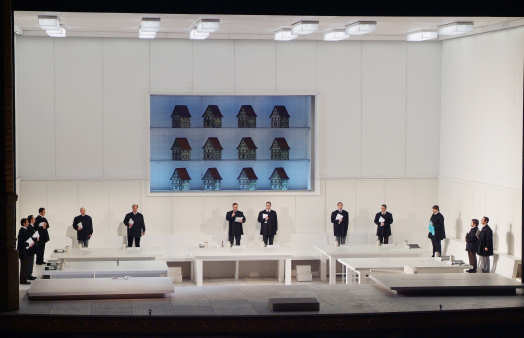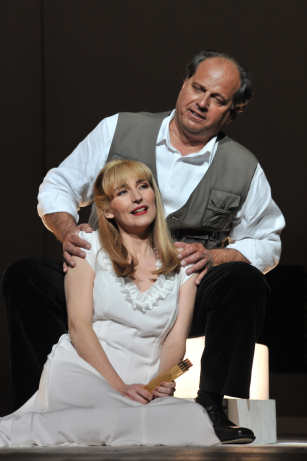Other Links
Editorial Board
-
Editor - Bill Kenny
-
Deputy Editor - Bob Briggs
Founder - Len Mullenger
Google Site Search
SEEN AND HEARD
INTERNATIONAL OPERA REVIEW
Wagner, Die Meistersinger von Nürnberg :
Soloists, Orchestra and Chorus Gran Teatre del Liceu.
Conductor:
Sebastian Weigle. Gran Teatre del Liceu de Barcelona. 17.3.2009 (JMI)
What does Claus Guth want to say with this production? What is the
meaning of its dramaturgy?
Like many others, I suspect, I
have long given up on trying to
tease out 'messages'
from stage directors and prefer
instead to concentrate on the music and
singing, which is really what I go to the opera for
in the first place. Unfortunately,
there was no explanation of the production from Mr Guth
in the programme so I decided to simply
enjoy the music without one.
Production from Sächsische Staatsoper Dresden.
Director: Claus Guth.
Sets and Costumes: Christian Schmidt.
Lighting: Jan Seeger
Cast:
Hans Sachs: Albert Dohmen.
Walther von Stolzing: Robert Dean Smith.
Eva: Veronique Gens.
Beckmesser: Bo Skovhus.
Pogner: Reinhard Hagen.
David: Norbert Ernst.
Magdalene: Stella Grigorian.
Fritz Kothner: Robert Bork.
Night Watchman: Magnus Baldvinsson.
Kunz Vogelgesang: Yves Saelens.
Konrad Nachtigall: Kurt Gyssen.
Balthasar Zorn: Roger Padullés.
Ulrich Eisslinger: Ángel Rodríguez.
Agustin Moser: José Ferrero.
Hermann Ortel: Joseph Ribot.
Hans Schwarz: Tobias Schabel.
Hans Foltz: Dario Russo.

This time, the difficulties have been
overcome admirably, with the correct balance being found between
orchestra, vocalists and an exceptional chorus. Joy,
it seems can hardly
ever be complete however, and to compensate for all this we had to
suffer a far from acceptable production.
The production by Claus
Guth came from Dresden, where it was premiered in October of
2007. It is not easy to understand what determined the Liceu to
offer it. The Barcelona audience cannot be
considered as traditionalists - on the contrary it is probably
Spain’s most open-minded as far as modern productions are concerned
- but the
audience reaction gave
little room for doubt that it was
unpopular. If the management thought that
this production was ideal for a faithful
Barcelona audience, then a huge rift has opened between
the theatre's taste and that
of its customers. The final verdict could not have been more
eloquent, with almost unanimous sonorous booing. For the first time
ever I saw no smiles at all
from he members of the creative team when
taking their bows.

Hans Sachs: Albert Dohmen and Eva: Veronique Gens
The opera works quite well in Act I, with white walls and a
profusion of tables for the Meistersinger and good contrast between
black and white, as if we were seeing the
confrontation between the two different
concepts of art on which the plot depends.
But after Act I, there
was no Nürnberg, nor meadow, nor houses.
For Act II Claus Guth put the sets from the
first act upside down, with tables hanging from the ceiling,
presumably symbolising St. Johann’s night as a time when norms are
transgressed. The fight that ends this act shows David undressing
and then castrating (blood included) Beckmesser, while the protagonists
are shown wearing beasts' heads. These things feel
like details without any real sense,
aimed simply to provoke, contributing nothing to the work,
and indeed detracting from it. To replace
the houses in Nürnberg by small models, from one
of which Magdalene tries to show part of her face through a
tiny window, had no sense
either, at least for me and – more
importantly - for most
of the audience
Sebastián Weigle has lately become one of
the more familiar Meistersinger
conductors, having been musical director for the last two
years of Katharina Wagner's
controversial production at Bayreuth. It is clear that his reading
of the work has matured, and today he offers an excellent interpretation of the opera. I found it
slightly short of solemnity during the
overture and not too fluid at the end of Act II, but this last is
quite understandable considering what was
happening on stage. Musically, this
was a performance full of strength and tension, much better than I
heard from him two years ago in Bayreuth. The
Liceu orchestra was much improved too
over past occasions, particularly in the last act. There was
an outstanding performance by the Chorus,
which is probably the only one in Spain able to face
up to this opera's
inherent difficulties.
Albert Dohmen is also probably the best
Hans Sachs around today. I will not say
that he can be compared to the great ones in history, because for
that he would need a bigger
presence, and more brightness in his high
notes, but his performance was still
magnificent. Hans Sachs and the young
Siegfried are the two Wagner characters who
have to sing the most and it is almost an act of
heroism in itself to get to the last scene of
Meistersinger with the voice
still fresh and in full power. But Dohmen
can. He was also a great
interpreter, using beautifully soft singing and becoming the centre
of the stage every time he was on it. He
was an outstanding interpreter of the shoemaker Master.
Robert Dean Smith was a good Walther von Stolzing, offering
yet again a
beautiful lyric tenor voice, which although
not too powerful, is certainly
very musical. I do not believe that he was at his best at
this performance, since some high notes
were rather forced at
times, most noticeably in the
famous quintet.
The French soprano Veronique Gens was a very
pleasant surprise as Eva. I had always
heard her in Mozart operas until now,
but her Wagner debut was very promising. She is not
quite a Wagner soprano, but
she doesn't need to be to sing Eva.
The Swedish baritone Bo Skovhus was
Beckmesser and seemed
rather too young for the character, since there are several
references to his age during the opera. It felt
strange to have a Beckmesser who is younger than Walther
but he was a remarkable interpreter from a vocal point of
view, although I was inclined to believe
that he overacted unnecessarily sometimes,
as if we were in an opera buffa. Mr Guth's
hand was behind this,
I suspect.
Norbert Ernst
gave an excellent performance as David, a character that fits him
like a glove and would be difficult to improve. Stella
Grigorian was a good Magdalene in vocal terms, but not so good as an
interpreter. Reinhard Hagen was a decent Pogner, and Robert Bork
acceptable as Fritz Kothner.
This was the first performance of the run and there were a few empty
seats. At the final bows there was a
well-deserved success for Albert Dohmen and there were also cheers
for Sebastian Weigle and the Orchestra. As I said
already, the creative team received a sonorous and mostly
unanimous booing.
José M Irurzun
Pictures © Antoni Bofill
Back
to Top
Cumulative Index Page
